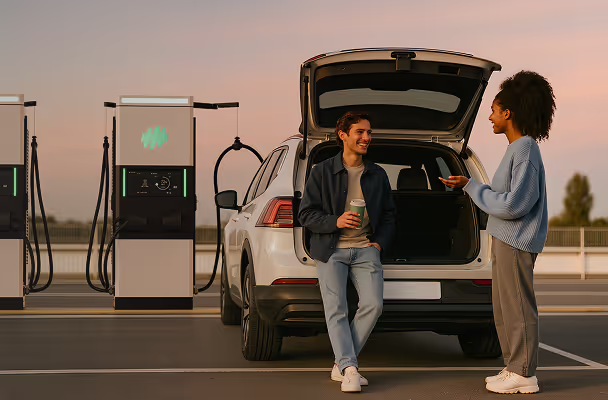Smart Charger

What is a Smart Charger?
A smart charger is an electric vehicle (EV) charging device that uses digital technology to enhance the charging process. Unlike standard chargers, smart chargers are connected to the internet and can communicate with other devices, enabling users to monitor and control charging remotely. Smart chargers provide features such as real-time status updates, remote scheduling, load balancing, and energy management, making them an essential part of modern EV Charging infrastructure.
Why Smart Chargers Matter
Smart chargers are crucial for optimizing the efficiency and flexibility of EV Charging. They enable features that reduce energy costs, ensure more efficient use of grid resources, and improve the user experience. By integrating with smart grids, smart chargers help avoid grid overloads during peak times, allowing for the more sustainable use of electricity. They also help integrate renewable energy sources, like solar power, by intelligently scheduling charging when clean energy is abundant.
How it Works
Smart chargers connect to the internet through Wi-Fi, Bluetooth, or cellular networks, allowing users to manage and monitor the charging process through mobile apps or web interfaces. They collect data from the EV and the grid to adjust charging speeds, optimize energy consumption, and ensure that the vehicle is charged safely. Many smart chargers can also schedule charging sessions to take advantage of lower electricity prices or renewable energy availability, making them more cost-effective for users.
Key Technologies / Features
- Remote Control and Monitoring: Smart chargers allow users to monitor and control their charging session remotely through apps or web interfaces.
- Energy Management: These chargers optimize energy consumption based on grid conditions, pricing, and available renewable energy.
- Dynamic Load Balancing: Smart chargers can communicate with other devices to balance power usage across multiple chargers, preventing grid overloads.
- Integration with Renewable Energy: Smart chargers can be programmed to prioritize renewable energy sources, reducing reliance on grid power and lowering emissions.
Applications
- Home Charging: Smart chargers for home users allow for remote monitoring and control of charging sessions, ensuring that EV owners charge their vehicles conveniently and cost-effectively.
- Workplace Charging: Businesses use smart chargers to optimize the energy usage and manage employee charging schedules.
- Public Charging Stations: Charging networks integrate smart chargers to offer dynamic pricing and load management, providing more efficient services for users.
- Fleet Charging: Smart chargers help fleet operators optimize energy use and ensure that their EVs are charged during off-peak hours to reduce operational costs.
Benefits
Smart chargers provide greater flexibility, allowing EV owners to monitor and control their charging experience. They reduce energy costs, improve grid efficiency, and help integrate renewable energy sources into the charging process. Smart chargers also help manage the increasing demand for charging infrastructure as more EVs hit the road, ensuring that the grid can accommodate the growing number of users.
Use Cases
Tesla’s Wall Connector and ChargePoint’s smart chargers are great examples of intelligent charging systems that offer real-time monitoring, remote management, and integration with renewable energy sources. In India, companies like Tata Power are implementing smart chargers in public and private charging stations to optimize energy consumption and manage the growing demand for EV charging.




